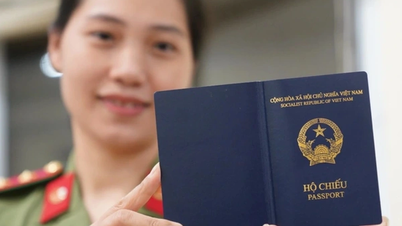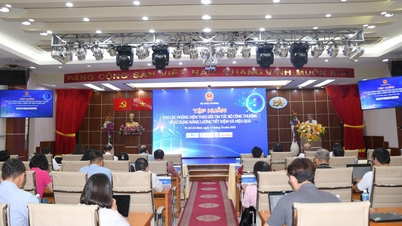Through hundreds of conversations, through experience observing American behavior, research and synthesis of thoughts, Mr. Gary Althen compiled the book American Ways.
 |
| Gary Althen edited American Ways. |
Gary Althen is a longtime expert on foreign students at the University of Iowa. He has extensive experience explaining American customs not only to foreign students, but also to immigrants and visitors to the United States. He has spent considerable time abroad (particularly in Indonesia and Peru) comparing American culture with foreign cultures.
Through hundreds of conversations, through experience observing American behavior, research and synthesis of thoughts, he compiled the book American Ways (Intercultural Press, Inc, Yarmouth Maine 1988) - a guidebook for foreigners coming to the United States.
The work aims to analyze the characteristics of American behavior, and at the same time suggest appropriate behaviors in the American social environment and with Americans abroad. Below, a few excerpts are summarized:
Many Americans consider themselves to be open, honest and quite friendly. If you ask them a question, they answer immediately, without hiding anything. They do not understand why it is difficult for other people to understand them. Of course, excluding the language problem. But in fact, most foreigners have difficulty understanding Americans. Even if they are good at English, they still feel somewhat confused, not knowing what Americans think and feel.
Here is an example to prove that it is possible that people misjudge American morality due to not understanding the social psychology: Mr. Apdula, an Egyptian, came to the US to study for an engineering degree. He met an American engineer, Wilson, 49 years old, who had a wife, a 22 year old daughter and a 19 year old son. The family was hospitable, occasionally inviting Mr. Apdula to dinner or for entertainment. Mr. Wilson's father passed away two years ago.
One Sunday, the family invited their new friend to visit the widow in the nursing home. The home was quite crowded with elderly people, some lying in their own rooms, others sitting quietly in the common room, some playing cards or watching TV. Mr. Wilson's mother, although old and a little hard of hearing, was very alert and active. He said he tried to visit her once a week, sometimes once every two weeks if he was busy with work. His wife sometimes went with him, but the children were busy with school so they rarely went.
Knowing this, Mr. Apdula was surprised and indignant. Why not let the old lady live with the family! Maybe Mr. Apdula judged Mr. Wilson like this: a selfish person, not fulfilling his filial piety, maybe the old lady had some illness that needed special care so she could not stay at home, this was not necessarily true! Or maybe his wife was a monster. There was a reason about American thinking that Mr. Apdula did not expect: Americans are educated from childhood to live independently, not to bother anyone. It is very possible that the old lady preferred to live in a nursing home because she had more freedom, not to feel like a burden. Mr. Apdula misjudged his friend because he applied Egyptian family standards.
Generalizations about the psychology of a nation are difficult and sometimes dangerous. Especially in the case of America. The American race is very diverse, due to the increasing number of immigrants, there are all kinds of skin: white, black, brown, yellow, red. Religions are also diverse: Catholic, Protestant, Jewish, Muslim, Buddhist, animist, and even atheist. Some people are highly educated, some are illiterate. Political colors are very diverse. With such complexity, we need to see: from some angles, all types of people are the same, or each group of people is the same, or each person is just like himself... An American may seem like no one else; but if you compare a group of Americans with a group of Japanese, the similarities in each group emerge.
“Americanness” applies primarily to middle-class white Americans, a class that has long held key positions in the American community. They include leading politicians, businessmen, university leaders, scientists , journalists, and writers. It can be said that “American culture” is characterized by a strong white middle-class character.
What are the reasons that have motivated Americans to behave in this way and not in another way like the Chinese or the Spanish? Finding the decisive cause for each case is impossible. Some researchers often propose the following factors to explain American culture: the development of American history in the 19th century, in a vast frontier country opening to the West; the origin of the people from social rebels of the European lower classes; the high development of technology; the influence of Christianity and its decline; the capitalist economic system...
How do Americans perceive themselves and their culture? If asked individually, few would consider themselves representative of the American people, because they think of themselves as individuals. Many people do not like generalizations about Americans. But they are quick to generalize about community groups in the United States; they easily list the characteristics of North Americans, South Americans, rural and urban people, coastal and inland people, ethnic minorities, New Yorkers, Californians... Parents, teachers, school textbooks, newspapers... have gradually created Americans' perceptions of foreigners, so they naturally perceive themselves.
“Americans often believe their country is superior, possibly the “greatest” country in the world. Believing their country is superior, Americans naturally often consider other countries inferior… Foreign visitors often find Americans in general condescending, regarding them more or less as children, inexperienced and possibly of limited intelligence.
It is rightly reminded that Americans treat foreigners as inferior human beings not out of malice or on purpose. They behave that way because they have been taught to act that way.” There are exceptions for Americans who travel abroad a lot or have a lot of contact with foreign countries. Americans respect British writers, German scientists, Korean martial artists, Kenyan runners, etc.
Source



![[Photo] Closing ceremony of the 18th Congress of Hanoi Party Committee](https://vphoto.vietnam.vn/thumb/1200x675/vietnam/resource/IMAGE/2025/10/17/1760704850107_ndo_br_1-jpg.webp)


































![[Photo] Nhan Dan Newspaper launches “Fatherland in the Heart: The Concert Film”](https://vphoto.vietnam.vn/thumb/1200x675/vietnam/resource/IMAGE/2025/10/16/1760622132545_thiet-ke-chua-co-ten-36-png.webp)











































































Comment (0)